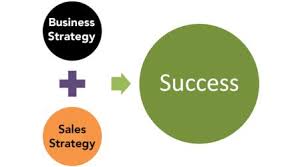4 Ways Technology Heavily Impacts Modern Sales Strategies
 Technology is the driving force behind much of what is termed modern business. From marketing to sales, the technological footprint is present at every level of the process making it easier for businesses to reach more customers with their brands and products. As business owners and consumers have become accustomed to using technology throughout the world of commerce, it is difficult to think of how businesses ever made so many sales without these tech-based advancements. This is especially the case in the area of how technology has been used to improve the modern business's approach to developing sales strategies. Here are a few examples for consideration.
Technology is the driving force behind much of what is termed modern business. From marketing to sales, the technological footprint is present at every level of the process making it easier for businesses to reach more customers with their brands and products. As business owners and consumers have become accustomed to using technology throughout the world of commerce, it is difficult to think of how businesses ever made so many sales without these tech-based advancements. This is especially the case in the area of how technology has been used to improve the modern business's approach to developing sales strategies. Here are a few examples for consideration.
From The Physical To The Digital
In the past, a business relied mostly on finding the right location for their bricks and mortar store. A common sales strategy involved marketing that drew more foot traffic into their stores. Today, the very idea of the physical bricks and mortar store has become something of a dated concept in modern business sales strategies. With the advent of the Internet, the physical store has been replaced with the digital website. Instead of marketing to get foot traffic, sales strategies aim to entice customers and clients who surf the web to visit websites to learn more about a company's products, services and other brand-related content. Virtual reality makes it convenient for companies to give potential customers a full digital presentation of what it would be like to own their own hot tub or learn about the maintenance behind such a purchase: to say nothing about an overview of all the health benefits involved. When it comes to the online website-based storefront, even the physical checkout counter has been replaced with a digital shopping cart and checkout process, making the shopping experience a far more convenient process for web traffic being streamlined by these types of digitally driven sales strategies.
App Sales
With the advent of smartphone technology, an entirely new landscape of digital advertising and customer-related app development was introduced to give businesses even more access to consumers on the move. The push for companies to build apps in order to be able to grab market share in the mobile device side of the digital content boom became a whole new way for sales to be executed. Specific store apps also became a great sales strategy generator for companies who wanted to offer consumers on-demand coupons and limited time deals in the moment while engaging these consumers through their normal mobile browsing experience. Many of these apps also draw in potential sales through interfaces that operate more like a game than a shopping experience; yet, taking a major departure from older forms of product marketing strategies occurring through more traditional mainstream avenues.
POS Systems
Since the physical store model is still a part of the mainstream sales process, it has become more advantageous to business sales strategies to update their Point Of Sale (POS) systems. In some ways this has brought radical changes to how selling products is done in stores and even sit down restaurants. Many of these modern POS systems provide far more management and customer engagement options than were available in years past. The ability to manage reservations, modify inventory options on the fly, handle digital payment options and provide better streamlined services through POS software solutions has made it easier for businesses to customize how their sales strategies play out in the unique business environment in which they operate.
Blogs And Podcasts
Another way that businesses have improved their sales strategies with modern technology is through highly informative blogs and podcasts. Oftentimes, it is easier to sell a product or service to a customer when the customer is provided with high quality information about said products. Product blogs and podcasts provide a significant bridge of communication between businesses and their customer base in this area of marketing and sales. As customers learn more about what a company's products do, they are not only simply a customer buying a product; but rather, they are a customer who now buys a product from an informed perspective. Adding this style of tech-driven approach to a company's sales strategies can truly bring customers closer in line with the way a company wants the customer to think about their brand. This in turn helps a business to create a stronger bond that leads to tighter customer loyalty over time and also leads to repeat sales.
Technology is everywhere in the realm of modern business. Every day technology plays a central role in the sales strategies of companies that span the globe. Technology not only puts these companies in touch with new potential customers, but it also helps them to manage ongoing relationships with their long term customer base as well. In essence, technology has made it possible for even a business that operates in the digital realm to make its brand felt across the globe in very powerful ways. To ignore the reality of the impact that technology provides to a business's sales strategy is to miss out on the potential for a company to earn significantly more profits today than were possible to earn in decades past.

 Delicious
Delicious Digg
Digg StumbleUpon
StumbleUpon Propeller
Propeller Reddit
Reddit Magnoliacom
Magnoliacom Newsvine
Newsvine
Comments
Post new comment